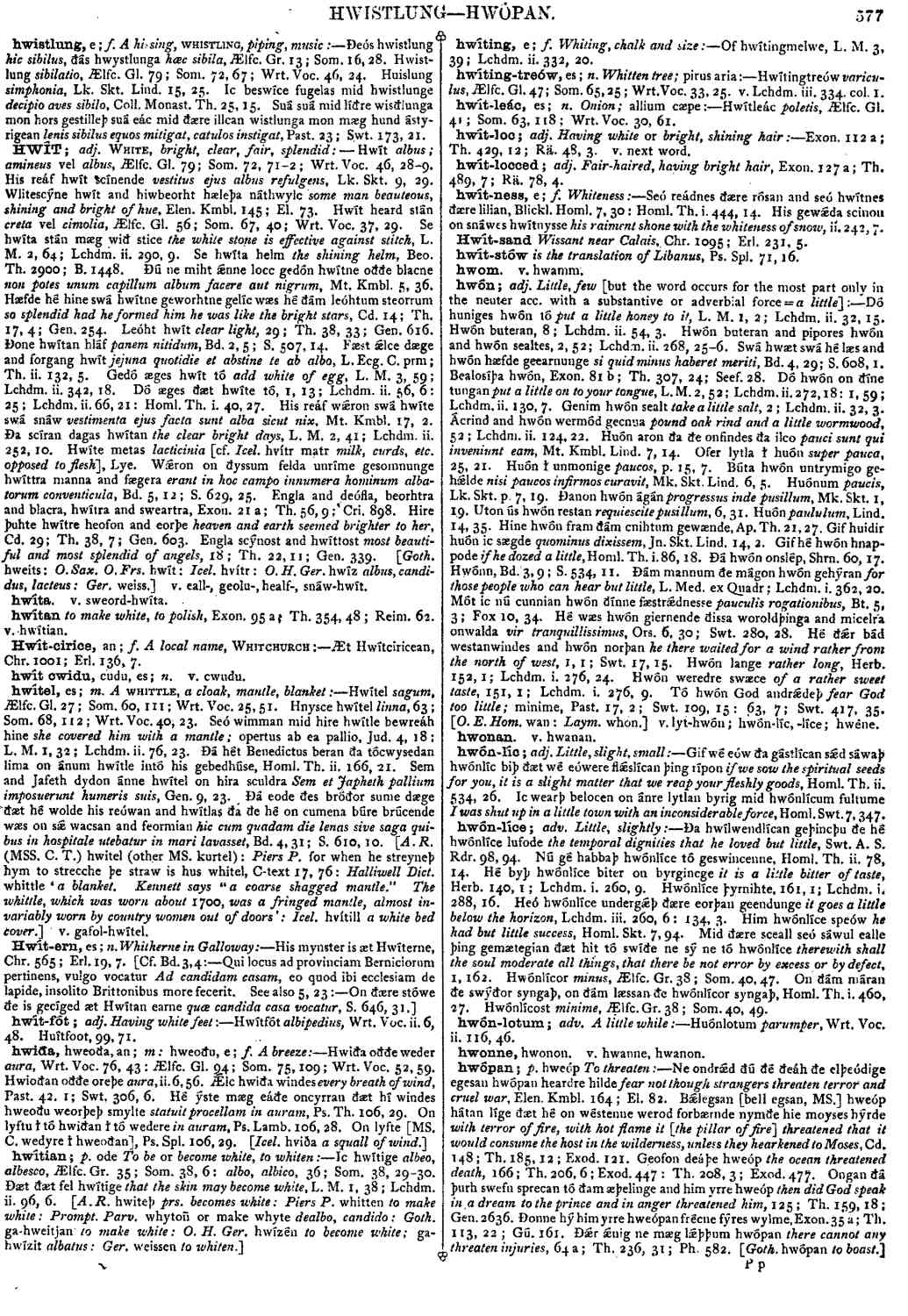hwón
- adjective
-
Dó huniges hwón tó
put a little honey to it,
- L. M. 1, 2 ;
- Lchdm. ii. 32, 15.
-
Hwón buteran,
- 8 ;
- Lchdm. ii. 54, 3 .
-
Hwón buteran and pipores hwón and hwón sealtes,
- 2, 52 ;
- Lchdm. ii. 268, 25-6 .
-
Swá hwæt swá hé læs and hwón hæfde geearnunge
si quid minus haberet meriti,
- Bd. 4, 29 ;
- S. 608, 1 .
-
Bealosíþa hwón,
- Exon. 81 b ;
- Th. 307, 24 ;
- Seef. 28 .
-
Dó hwón on ðíne tungan
put a little on to your tongue,
- L. M. 2, 52 ;
- Lchdm. ii. 272, 18 :
- 1, 59 ;
- Lchdm. ii. 130, 7 .
-
Genim hwón sealt
take a little salt,
- 2 ;
- Lchdm. ii. 32, 3 .
-
Ácrind and hwón wermód gecnua
pound oak rind and a little wormwood,
- 52 ;
- Lchdm. ii. 124, 22.
-
Huón aron ða ðe onfindes ða ilco
pauci sunt qui inveniunt eam,
- Mt. Kmbl. Lind. 7, 14 .
-
Ofer lytla ł huón
super pauca,
- 25, 21 .
-
Huoó ł unmonige
paucos,
- p. 15, 7 .
-
Búta hwón untrymigo gehǽlde
nisi paucos infirmos curavit,
- Mk. Skt. Lind. 6, 5.
-
Huónum
paucis,
- Lk. Skt. p. 7, 19.
-
Ðanon hwón ágán
progressus inde pusillum,
- Mk. Skt. 1, 19.
-
Uton ús hwón restan
requiescite pusillum,
- 6, 31 .
-
Huón
paululum,
- Lind. 14, 35.
-
Hine hwón fram ðám cnihtum gewænde,
- Ap. Th. 21, 27 .
-
Gif huidir huón ic sægde
quominus dixissem,
- Jn. Skt. Lind. 14, 2.
-
Gif hé hwón hnappode
if he dozed a little,
- Hom. Th. i. 86, 18.
-
Ðá hwón onslép,
- Shrn. 60, 17.
-
Hwónn,
- Bd. 3, 9 ;
- S. 534, 11 .
-
Ðám mannum ðe mágon hwón gehýran
for those people who can hear but little,
- L. Med. ex Quadr :
- Lchdm. i. 362, 20.
-
Mót ic nú cunnian hwón dínne fæstrǽdnesse
pauculis rogationibus,
- Bt. 5, 3 ;
- Fox 10, 34 .
-
Hé wæs hwón giernende ðissa woroldþinga and micelra onwalda
vir tranquillissimus,
- Ors. 6, 30 ;
- Swt. 280, 28 .
-
Hé ðǽr bád westanwindes and hwón norþan
he there waited for a wind rather from the north of west,
- 1, 1 ;
- Swt. 17, 15 .
-
Hwón lange
rather long,
- Herb. 152, 1 ;
- Lchdm. i. 276, 24.
-
Hwón weredre swæce
of a rather sweet taste,
- 151, i ;
- Lchdm. i. 276, 9 .
-
Tó hwón God andrǽdeþ
fear God too little;
minime,
- Past. 17, 2 ;
- Swt. 109, 15 :
- 63, 7 ;
- Swt. 417, 35 .
Bosworth, Joseph. “hwón.” In An Anglo-Saxon Dictionary Online, edited by Thomas Northcote Toller, Christ Sean, and Ondřej Tichy. Prague: Faculty of Arts, Charles University, 2014. https://bosworthtoller.com/20198.
Checked: 1